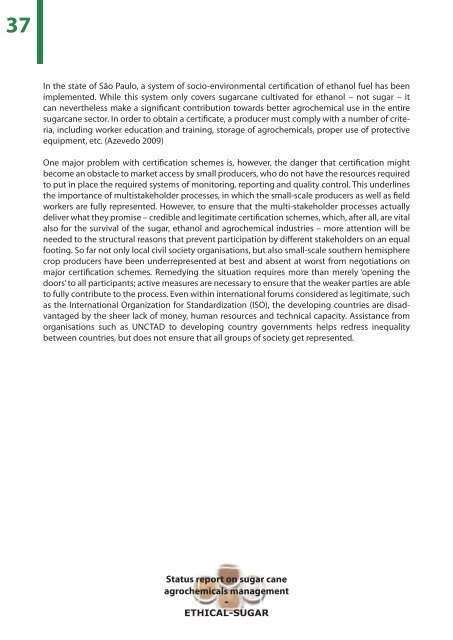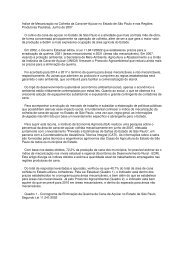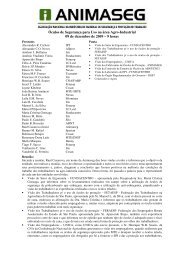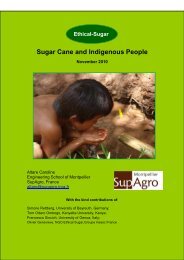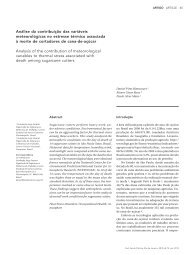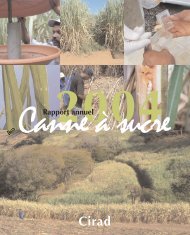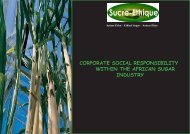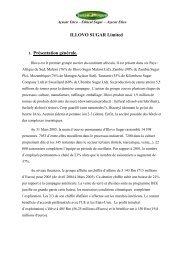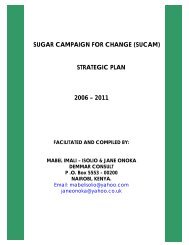Status report on sugar cane agrochemicals ... - Sucre Ethique
Status report on sugar cane agrochemicals ... - Sucre Ethique
Status report on sugar cane agrochemicals ... - Sucre Ethique
Create successful ePaper yourself
Turn your PDF publications into a flip-book with our unique Google optimized e-Paper software.
37<br />
In the state of São Paulo, a system of socio-envir<strong>on</strong>mental certi� cati<strong>on</strong> of ethanol fuel has been<br />
implemented. While this system <strong>on</strong>ly covers <strong>sugar</strong><strong>cane</strong> cultivated for ethanol – not <strong>sugar</strong> – it<br />
can nevertheless make a signi� cant c<strong>on</strong>tributi<strong>on</strong> towards better agrochemical use in the entire<br />
<strong>sugar</strong><strong>cane</strong> sector. In order to obtain a certi� cate, a producer must comply with a number of criteria,<br />
including worker educati<strong>on</strong> and training, storage of <strong>agrochemicals</strong>, proper use of protective<br />
equipment, etc. (Azevedo 2009)<br />
One major problem with certi� cati<strong>on</strong> schemes is, however, the danger that certi� cati<strong>on</strong> might<br />
become an obstacle to market access by small producers, who do not have the resources required<br />
to put in place the required systems of m<strong>on</strong>itoring, <str<strong>on</strong>g>report</str<strong>on</strong>g>ing and quality c<strong>on</strong>trol. This underlines<br />
the importance of multistakeholder processes, in which the small-scale producers as well as � eld<br />
workers are fully represented. However, to ensure that the multi-stakeholder processes actually<br />
deliver what they promise – credible and legitimate certi� cati<strong>on</strong> schemes, which, after all, are vital<br />
also for the survival of the <strong>sugar</strong>, ethanol and agrochemical industries – more attenti<strong>on</strong> will be<br />
needed to the structural reas<strong>on</strong>s that prevent participati<strong>on</strong> by di� erent stakeholders <strong>on</strong> an equal<br />
footing. So far not <strong>on</strong>ly local civil society organisati<strong>on</strong>s, but also small-scale southern hemisphere<br />
crop producers have been underrepresented at best and absent at worst from negotiati<strong>on</strong>s <strong>on</strong><br />
major certi� cati<strong>on</strong> schemes. Remedying the situati<strong>on</strong> requires more than merely ‘opening the<br />
doors’ to all participants; active measures are necessary to ensure that the weaker parties are able<br />
to fully c<strong>on</strong>tribute to the process. Even within internati<strong>on</strong>al forums c<strong>on</strong>sidered as legitimate, such<br />
as the Internati<strong>on</strong>al Organizati<strong>on</strong> for Standardizati<strong>on</strong> (ISO), the developing countries are disadvantaged<br />
by the sheer lack of m<strong>on</strong>ey, human resources and technical capacity. Assistance from<br />
organisati<strong>on</strong>s such as UNCTAD to developing country governments helps redress inequality<br />
between countries, but does not ensure that all groups of society get represented.<br />
<str<strong>on</strong>g>Status</str<strong>on</strong>g> <str<strong>on</strong>g>report</str<strong>on</strong>g> <strong>on</strong> <strong>sugar</strong> <strong>cane</strong><br />
<strong>agrochemicals</strong> management<br />
-<br />
ETHICAL-SUGAR


